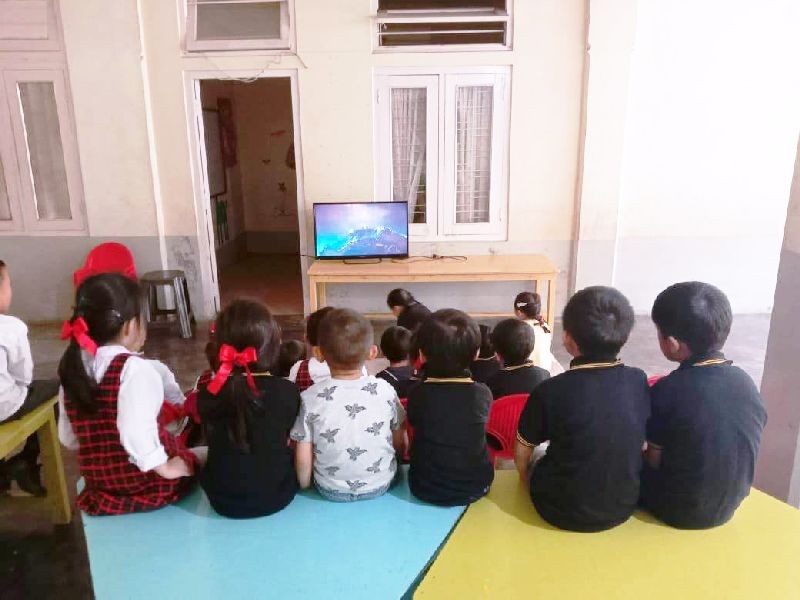Children of Bumblebee Inclusive School, Kohima watching a movie. (Morung Photo)

Global Accessibility Awareness Day in Nagaland
Vishü Rita Krocha
Kohima | May 22
At Bumblebee Inclusive School, Kohima, a little over 30 young students are currently enrolled to start their first journey of education and are being taught through various mediums of learning including technology. As an inclusive primary set up, the school is trying to incorporate learning using audio and visual programming of songs, rhymes, stories, and value education including concept teaching with the use audio books series.
On Global Accessibility Awareness Day (GAAD) that falls on the third Thursday of May every year and is observed around the world to raise awareness about digital accessibility by persons with disabilities, Kopele V Tepa, Special educator & Headmistress of Bumblebee Inclusive School, Kohima, highlighted the importance of incorporating technology in educating children with special needs.
“It is an integral part of learning to supplement regular classroom teachings with an assortment of videos, apps, and technologies while teaching children with special needs because not all children get the required amount of exposure to nature to learn,” she stated. Impressing upon that “for children's creativity and imagination to come alive we need to constantly keep evolving in means and measures to teach,” she maintained that “regardless of whether a child has special needs or not, all children learn better when learning is made fun and introduced in more than one way.”
Bumblebee Inclusive School was established in the year 2012 with the motto “Igniting Young Minds”. “Since we do not want to overcrowd our classes we want to limit it to 15 students per class, our set up being inclusive in nature,” she enlightened. However the intake of students for the playgroup is open throughout the year.
Digital Accessibility in age of COVID-19
In the age of COVID-19, where learning solutions through television, radio and social media are being devised for students, Diethono Nakhro, State Commissioner for Persons with Disabilities (SCPD) said it is a very good move but strongly felt that “with no sign language interpretation and no close captioning provided, it does not benefit our children with disabilities at all.”
Stating that the Web has become a part of our everyday life and is an increasingly important resource that covers just about every aspect of our lives, she however asserted that “Digital or Web Accessibility and its importance are still generally very poorly understood among us.”
Citing the websites of government departments, she pointed out that many departments are going online with their services inclusive of information, applications forms and submissions, bill payments and so on and so forth. “But many still do not comply with web accessibility guidelines, which means their websites are inaccessible to many”, she stated and further emphasized that “it’s easy to say that this or that is available online, but when you don’t make your websites accessible then you are excluding a huge chunk of the society from availing of various kinds of information and opportunities.”
However, although majority of the official websites are still largely inaccessible, she expressed that the IT department has been proactive in its efforts. Reiterating the need for accessibility, she said this is something that really needs to be taken seriously even as a cashless society is being emphasized upon and with many services becoming web-based and work and studies going online in a big way especially now in this day and age of COVID-19.
“We are living in a world where we have to be able to access the Web to be able to gain full access to many areas, including healthcare, education, employment, government services, travel, commerce, recreation, and more,” she maintained.
Also pointing out that this usage is only going to grow bigger and bigger as we move forward, she emphasized that “if we don’t pay attention to web accessibility then we will again be leaving behind a significant section of our society who have historically been always neglected and left behind.”






